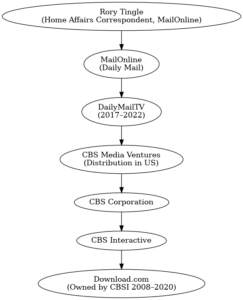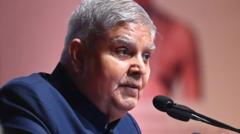In India, opposition parties have leveled serious allegations against the Election Commission regarding electoral misconduct that purportedly favored the ruling BJP in the recent elections. This has sparked significant political unrest and calls for a transparent investigation.
Allegations of Electoral Manipulation Ignite Controversy in India

Allegations of Electoral Manipulation Ignite Controversy in India
Political tensions rise as opposition parties claim 'vote theft' amidst the scrutiny of the 2024 general elections.
A significant political controversy has unfolded in India as accusations of "vote theft" have surfaced, with opposition factions alleging electoral irregularities that they claim benefitted the ruling Bharatiya Janata Party (BJP) throughout the 2024 general elections. This turmoil reached a peak on Tuesday when parliament was adjourned after opposition Members of Parliament insisted on discussing the integrity of India's electoral framework.
Just a day prior, police detained numerous opposition leaders, including prominent Congress figure Rahul Gandhi, as they marched toward the Election Commission of India (ECI) headquarters in New Delhi. Gandhi first articulated concerns regarding electoral integrity during a press briefing on August 7, which triggered widespread support from several opposition lawmakers. The ECI, alongside the BJP, has plagued these claims with fierce denials.
What precisely are the allegations against the Election Commission? Rahul Gandhi has claimed that there was extensive voter manipulation and fraudulent activity noted in the data from the Commission itself, despite the ECI and BJP refuting his assertions. The parliamentary elections led Prime Minister Narendra Modi to a third consecutive term; however, Modi’s BJP-led coalition did not achieve the sweeping victory initially anticipated. Voter turnout averaged an impressive 66% amid an electorate of nearly a billion registered voters.
Gandhi pointed to specific data from Mahadevapura in Bangalore Central, asserting that over 100,000 entries on the voter list were manipulated—citing examples such as duplicate voter registrations and questionable addresses. He presented a case of an alleged double voter, which the ECI disputed. Furthermore, he alleged that CCTV footage from polling areas was deleted and highlighted a troubling situation of 80 individuals registered at one address.
Gandhi contended that such voter manipulation contributed to the Congress party's loss of at least 48 parliamentary seats, accusing the electoral body of neglecting the "one man, one vote" principle. The Congress secured 99 seats, compared to the BJP's 240.
Gandhi has demanded the ECI make digital voter rolls available for public audit. The ECI swiftly dismissed his claims as "absurd" and asked him to either submit a signed declaration under oath or issue an apology to the public. The Karnataka chapter of the ECI noted that Congress did not present any formal objections during the revision of the electoral rolls leading up to the elections.
BJP officials have also voiced strong refutations against the allegations. Notably, federal education minister Dharmendra Pradhan expressed concern about what he termed anarchy that threatens democracy, while agriculture minister Shivraj Singh Chouhan accused Gandhi and the opposition of undermining democratic integrity.
The uproar comes at a sensitive moment, coinciding with the ongoing revision of electoral rolls in Bihar, where significant elections are slated for November. The ECI claims this revision, the first since 2003, aims to identify duplicate or deceased voters. Critics argue that the accelerated process risks disenfranchising various groups, particularly marginalized communities. Notably, numerous complaints have surfaced indicating inaccuracies on the draft voter lists.
As India’s Supreme Court addresses various petitions concerning the electoral roll revisions—which has led to the deletion of approximately 6.5 million voter names—the court has emphasized that claims of disenfranchisement appear tied to a "trust deficit" and warned it would intervene if mass voter exclusion is verified. Following his initial claims, Gandhi intensified his rhetoric, alleging systematic and national-level manipulation, and emphasized the need for transparency, stating, “there are unlimited cases like that.”



















